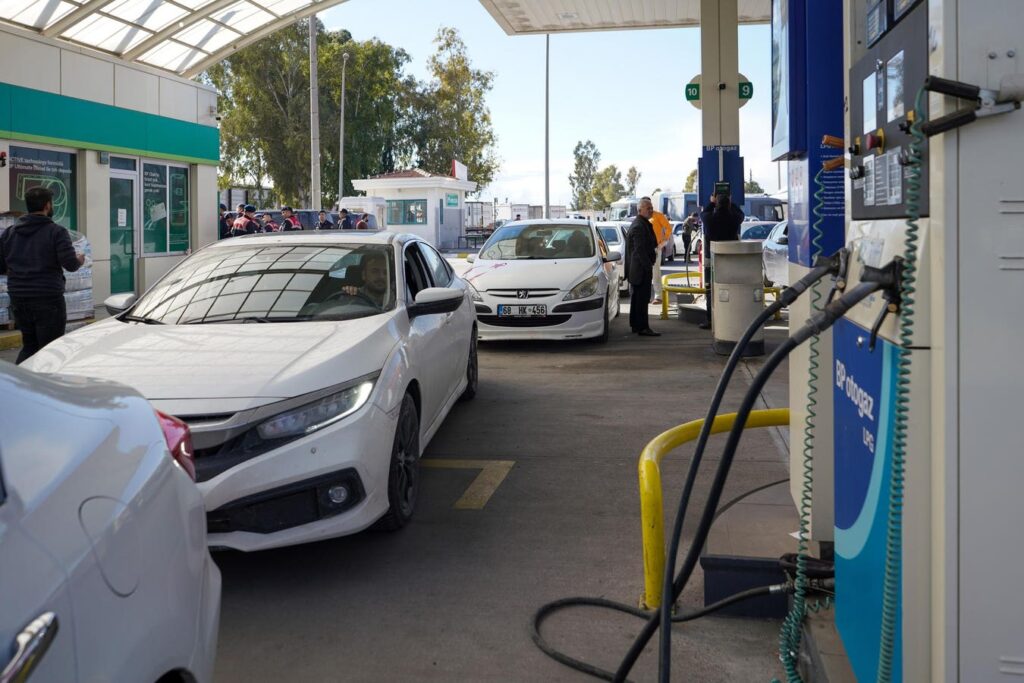ADANA, TURKEY – 2023/02/07: Cars seen queuing to refill gas at a gas station in Adana. Turkish … [+]
On his inauguration day, President Donald J. Trump signed an Executive Order entitled “Designating cartels and other organizations as foreign terrorist organizations and specially designated global terrorists.” This illustrates the new administration’s emphasis on the global fight against organized crime, with a primary focus on Latin America.
In addition to historically known avenues of illicit revenue generation, such as drug and human smuggling, organized crime groups are now penetrating formal economic sectors, including the fuel industry, and engaging in illicit fuel trafficking. While the Executive Order calls for the elimination of groups such as Tren de Aragua (TdA) and La Mara Salvatrucha (MS-13), this is made far more difficult with no measures to remove their presence from lucrative sectors, such as fuel smuggling. While limited progress has been made in Latin America, an effective approach may lie in successful technological measures employed overseas.
The Shadow Economy Threatens the United States
Fuel smuggling and energy theft have proven to be uniquely profitable vectors for crime organizations. Organized crime groups use their operations in these sectors to exploit regulatory gaps and launder money. For instance, in Brazil, drug gangs are bringing in far more money from fuel and other products than from cocaine trafficking, an expansion into formal economic sectors that has caused billions in tax losses and complicated efforts to root out organized crime.
A similar trend can be seen in Mexico, where fuel theft has been a major problem for Mexico’s government and state-owned petroleum company Pemex, costing it billions of dollars. Some of the stolen gasoline from Mexico is sold to third parties and then into the United States, as demonstrated by the case of a recently sanctioned man who calls himself “the tank.” Ivan Cazarin Molina allegedly leads a fuel theft ring for the hyper-violent Mexican cartel Jalisco New Generation. Beyond posing a violent threat to the country, criminal organizations contribute to a shadow economy in the U.S. that amounts to approximately $1.4 trillion. The revenue siphoned via fuel theft contributes to the resilience of cartels and criminal organizations, making it a high-priority target for the Trump administration.
Turkey Takes Action to Fight the Shadow Economy
The issue of fuel trafficking and the vast presence of a shadow economy is not only a Latin American problem, but a global one. For example, in Turkey, the informal economy accounts for 31.4% of GDP. The country has taken significant steps to address the grey and black market. To fight the shadow economy and boost tax revenues, Turkish Minister of Treasury and Finance Mehmet Şimşek unveiled the National Vehicle Identification System on October 5, 2023, aimed at digitally tracking fuel consumption across 8 million commercial vehicles starting in 2025.
ANKARA, TURKEY – OCTOBER 29: Turkish President Recep Tayyip Erdogan (R) shakes hands with Turkish … [+]
NVIS is based on industry standard, state-of-the-art radio frequency technology and works by a certified ex-proof RF tag installed at a vehicle’s fuel inlet and a reader installed at the fuel dispenser nozzle communicating in very close range. The taxpayer information is transmitted via a secure, closed network and verified online. The license plate number is then automatically sent to an electronic cash register for processing. This prevents fraud by replacing manual license plate entry by secure, verified and untampered recording of the license plate, fuel amount purchased, and total charged. This system is designed to eliminate tax fraud at gas stations by preventing manipulated fuel receipts and transactions and increasing the Turkish Treasury’s revenue.
This cutting-edge technological initiative is a milestone of Turkey’s fiscal strategy, digitally transforming fuel purchases across millions of vehicles to establish a transparent and traceable taxation system. NVIS also incorporates AI-powered analytics to detect anomalous fuel consumption patterns and flag potential tax evasion attempts, reinforcing compliance, market fairness, and regulatory oversight. Turkey’s development is reminiscent of the U.S. fight against car theft that led to the introduction of the National Motor Vehicle Title Information System in 1992. Since then, the motor vehicle theft rate in the U.S. has halved, illustrating the effectiveness of digitalization.
Fighting the Shadow Economy Using New Technology
In a world fascinated by modern technology, it is obvious that blockchain and AI in particular can be leveraged into a powerful tool designed to fight organized crime. Turkey is leading the way in this new method of crime fighting, and other countries could benefit from following suit.
There is already a clear interest in advancing digitalization across the world’s economies. President Trump announced $500 billion in private sector investment in artificial intelligence (AI) infrastructure, followed by France’s President Emmanuel Macron’s plans for 109 billion euros of private AI investment. American interest in AI also extends to its use in government, with a January 23rd Executive Order eliminating previous guidance posing barriers to adopting the technology in government agencies.
The use of cutting-edge technologies in government programs is critical to staying ahead of the ever-changing tactics of criminal organizations threatening American security and law and order. While traditional efforts to fight gangs and criminal organizations are essential and are likely to expand in the Trump administration, an advanced approach to combat the shadow economy is necessary to limit the ability of these groups to sustain themselves and their impact on the rest of the economy, especially in the fuel economy sector. By adopting AI-enabled digital transformation measures, the United States can revolutionize its approach to fighting crime and stay at the forefront of new technologies to save the taxpayer tens of billions of dollars.
Quin Buckley contributed to the production of this article.
Read the full article here
